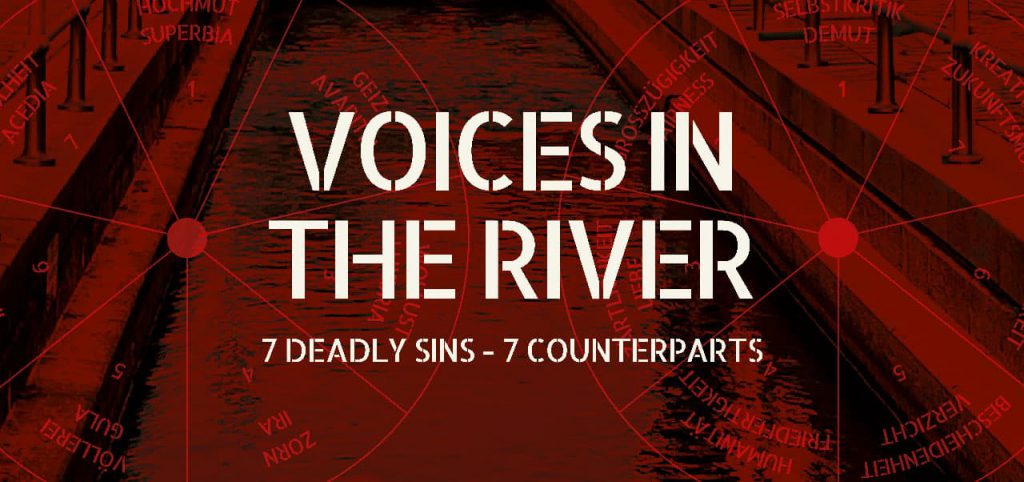
Preamble
Freising’s 1300-year history and Korbinian’s arrival mark the beginning of Christianization, which continues to have cultural and social impacts to this day. The biblical command, „Subdue the earth,“ has led to the ruthless exploitation of the earth and the destruction of nature. This is symbolized by the seven deadly sins. In light of increasing hotspots of conflict that undermine the core idea of Europe, „Never again war,“ the installation of the waterwheel on two discs reflects the contradiction: on one side, the seven deadly sins, and on the other side, the positive words that deny the inevitability of the deadly sins.
Stephanie Gölz & Andreas Meinel
Voices in the River – The Artwork
Location: Fischergasse in Freising
Duration: Saturday, June 15 – Saturday, October 12, 2024
Participants from the Region:
- Lorenz Abstreiter Metall & Design
www.metalldesign-abstreiter.de - Hermann Kiermeir, Halder Schneidtechnik GmbH
www.halderschneidtechnik.de - Christian Renner
www.deeply.design - Junkers Café Freising
www.junkerscafe.de
Mit freundlicher Genehmigung von:
- Landratsamt Freising
- Wasserwirtschaftsamt München
- Stadt Freising
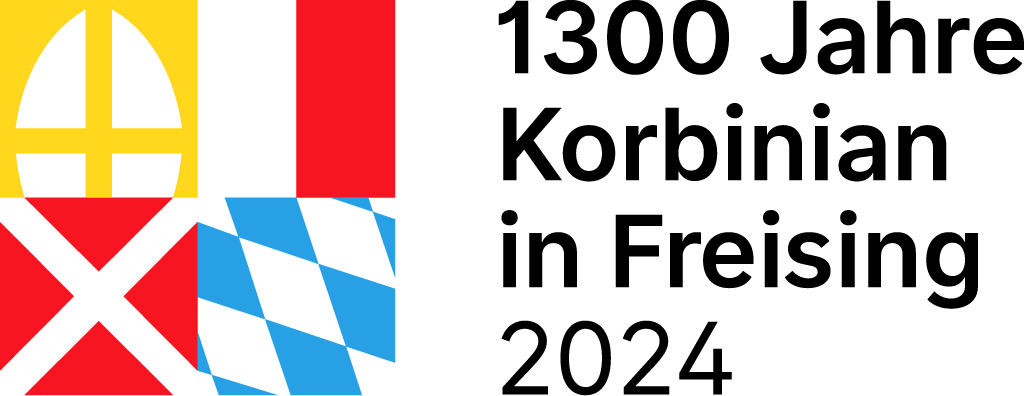
Veranstaltungen
All events take place on Saturdays from 6 PM to 7 PM at Junkers Café, Fischergasse 4, 85354 Freising.
In the Beginning is the Word. Each event begins and ends with theme-related thoughts from poetry and literature and is enriched with music, seriousness, and humor. In the End is the Conversation.
Opening by Mayor Tobias Eschenbacher
Saturday, June 15, 2024, 6 PM, followed by discussion until 7 PM:
Gluttony – GULA ↔ Moderation & Abstinence
Presented by: Dr. Claudia Pfrang + Pepito Anumu + Emmanuel and Birgit Brennich
Greed – AVARITIA ↔ Generosity & Fairness
Saturday, June 22, 2024, 6-7 PM – Presented by: Sina Hörl + Michaela John
Pride – SUPERBIA ↔ Humility & Self-Criticism
Saturday, June 29, 2024, 6-7 PM – Presented by: Richard Lorenz + Alexander Crow + The Blank Sheets
Wrath – IRA ↔ Peacefulness & Humanity
Saturday, July 6, 2024, 6-7 PM – Presented by: Toni Setzwein + Peter Schröter
Sloth – ACEDIA ↔ Creativity & Courage for the Future
Saturday, July 13, 2024, 6-7 PM – Presented by: Christina Mayer + Julia Schröter
Lust – LUXURIA ↔ Love & Tenderness
Saturday, July 20, 2024, 6-7 PM – Presented by: Prof. Dr. Christian Grimm + Lutz Thalmeier
Envy – INVIDIA ↔ Gratitude & Favor
Saturday, July 27, 2024, 6-7 PM – Presented by: Dr. Christoph von Schilling + Lilly von Schilling
Subdue the Earth
Saturday, August 3, 2024, 6-7 PM – Presented by: Auxiliary Bishop Bernhard Haßlberger + Häns Czernik

How many deadly sins are there, anyway?
Envy, greed, wrath – hardly anyone can completely absolve themselves of these and other emotions. The list of the seven deadly sins is still familiar to most people in countries with a Christian heritage, even though fear of purgatory is generally no longer prevalent. The list of sins originated in the early Middle Ages. It is a catalog of vices, listing the 7 deadly sins, in an attempt to explain human actions and behaviors within the tension between physical or spiritual needs and moral concepts as well as social interactions.
The term „the 7 deadly sins“ is somewhat misleading – Catholicism refers to them as capital sins or root sins because other sins can stem from them. Strictly speaking, the 7 deadly sins are more about character traits that lead to sins. According to Catholicism, those who die with a deadly sin in their heart face the torments of hell. Confession and repentance are ways to obtain God’s forgiveness. But what are the 7 deadly sins?
Quote from: Vorsorge Weitblick – A Portal of Vorsorgeweitblick LV1871.de
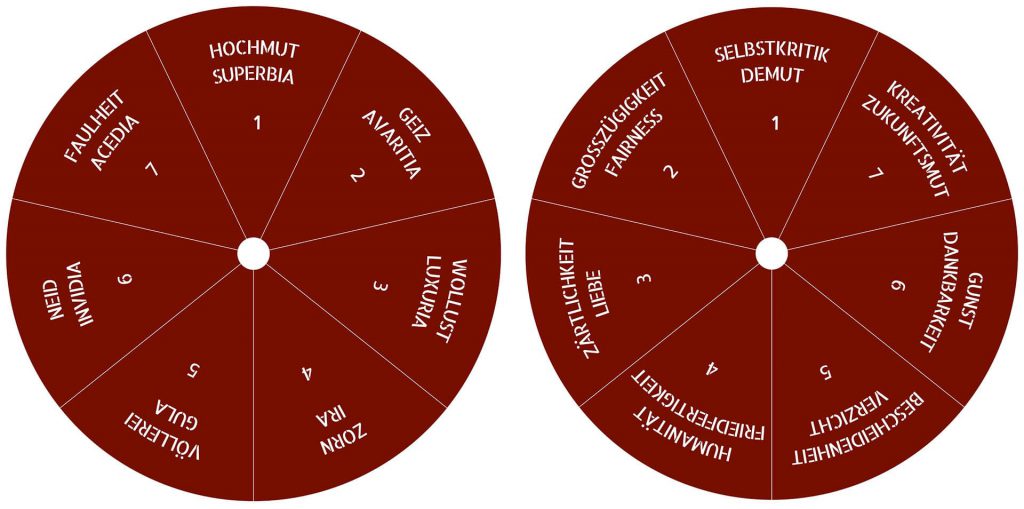
What are the 7 deadly sins? And what are their opposites?
- Pride – Superbia ↔ Self-Criticism, Humility
- Greed – Avaritia ↔ Generosity, Fairness
- Lust – Luxuria ↔ Tenderness, Love
- Wrath – Ira ↔ Humanity, Peacefulness
- Gluttony – Gula ↔ Moderation, Abstinence
- Envy – Invidia ↔ Favor, Gratitude
- Sloth – Acedia ↔ Creativity, Courage for the Future
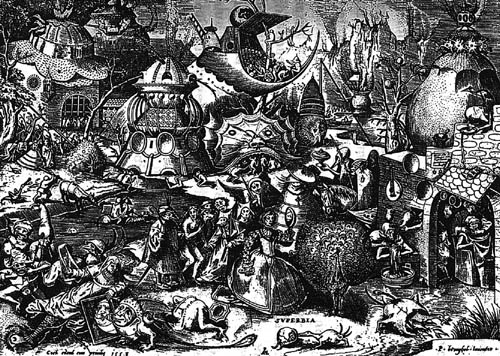
1. Pride – Superbia ↔ Self-Criticism, Humility
The Catholic Catechism ranks pride as the worst of all deadly sins. Superbia not only means that a person feels superior to all fellow human beings outwardly, but also internally blind to their own imperfections. Pride leads to overestimating oneself and believing in an idealized self-image. Humility provides a remedy here, allowing one to descend into the depths of the soul and accept them.
The deadly sin Superbia is often also translated as arrogance, pride, or self-exaltation. Pride is not only found in the Catholic Catechism but also in other world religions, such as Judaism, where people are also taught to be humble. This is justified by the belief that only God is great and almighty.
From a psychological perspective, there are two types of pride. One type is associated with narcissists, where the individual is unaware of their pride and believes themselves to be truly infallible. The other type of pride describes people who only feign it to mask their own insecurity.
Opposites: Self-Criticism, Humility
Self-criticism and humility are essential virtues that serve as opposites to the deadly sin of pride (Superbia). Pride, often referred to as arrogance or haughtiness, leads one to elevate themselves above others and overlook their own fallibility. In contrast, self-criticism enables a reflective examination of one’s own mistakes and weaknesses, contributing to personal growth and improvement. Humility, the acknowledgment of one’s own limits and frailties, fosters modesty and respectful interactions with others. These virtues help maintain a balanced and harmonious life, free from the destructive effects of pride.
Self-criticism is the harshest form of criticism. That is why self-criticism is so important. Only through it can a person improve.
Mahatma Gandhi

2. Greed – Avaritia ↔ Generosity, Fairness
Greed is also one of the seven deadly sins. The greedy person neither supports others with money or material goods nor treats themselves. The accumulation of wealth is driven by the fear of not having enough, and this becomes more important than truly enjoying life. When greedy people do allow themselves something or give away some of their possessions, they are often plagued by guilt. The Church views greed as a departure from life.
According to the stereotype, greedy people are not necessarily those without financial means. When we talk about greed, it is a conscious decision to not spend money.
This theme is often explored in art. Well-known examples include „Allegory of Greed“ by Matham and „The Miser“ by Hans Holbein the Younger.
Opposites: Generosity, Fairness
Generosity and fairness stand in stark contrast to the deadly sin of greed (Avaritia). While greed is characterized by excessive attachment to material possessions and an inability to share, generosity and fairness promote a life in harmony with the needs and rights of others. Generosity involves acting with liberality and selflessness, fostering a sense of community and solidarity. Fairness, as a principle of justice and equal treatment, ensures that every person receives equal value and recognition. These virtues help mitigate social injustices and encourage harmonious coexistence.
No one has ever become poor by giving.
Anne Frank
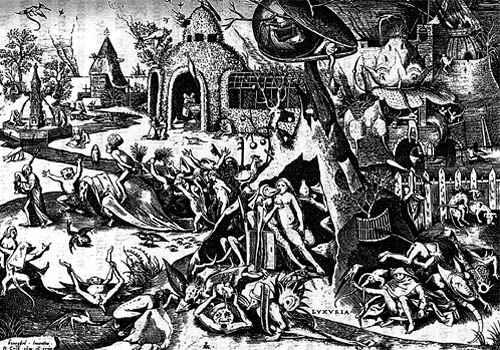
3. Lust – Luxuria ↔ Tenderness, Love
According to the Catechism, sexual desire should be suppressed. Sexual intercourse is intended solely for procreation, and any additional desires have no place here. Lust, or chastity and temperance, are not only related to sexual aspects – any actions driven or influenced by base instincts and desires are considered sinful. Chastity primarily refers to purity and clarity in all things, enabling one to live authentically from within.
Lust was given to the worm // while the cherub stands before God.
Friedrich Schiller in Thalia – Volume One
For lust has accompanied humanity since the beginning of time. However, the extreme view of the Catholic Catechism has diminished in the modern era and is no longer as heavily stigmatized.
Opposites: Tenderness, Love
Tenderness and love are powerful counterpoints to the deadly sin of lust (Luxuria). While lust is often characterized by the pursuit of purely physical gratification without deeper emotional connection, tenderness and love represent a deeper, respectful, and empathetic bond between people. Tenderness is expressed through gentle, loving gestures that promote comfort and trust. Love, as one of the strongest and purest human emotions, connects people on a deep emotional and spiritual level that goes far beyond the physical. These virtues help deepen relationships and create genuine intimacy based on respect and mutual understanding.
It’s not about how much we give, but how much love we put into giving.
Mutter Teresa
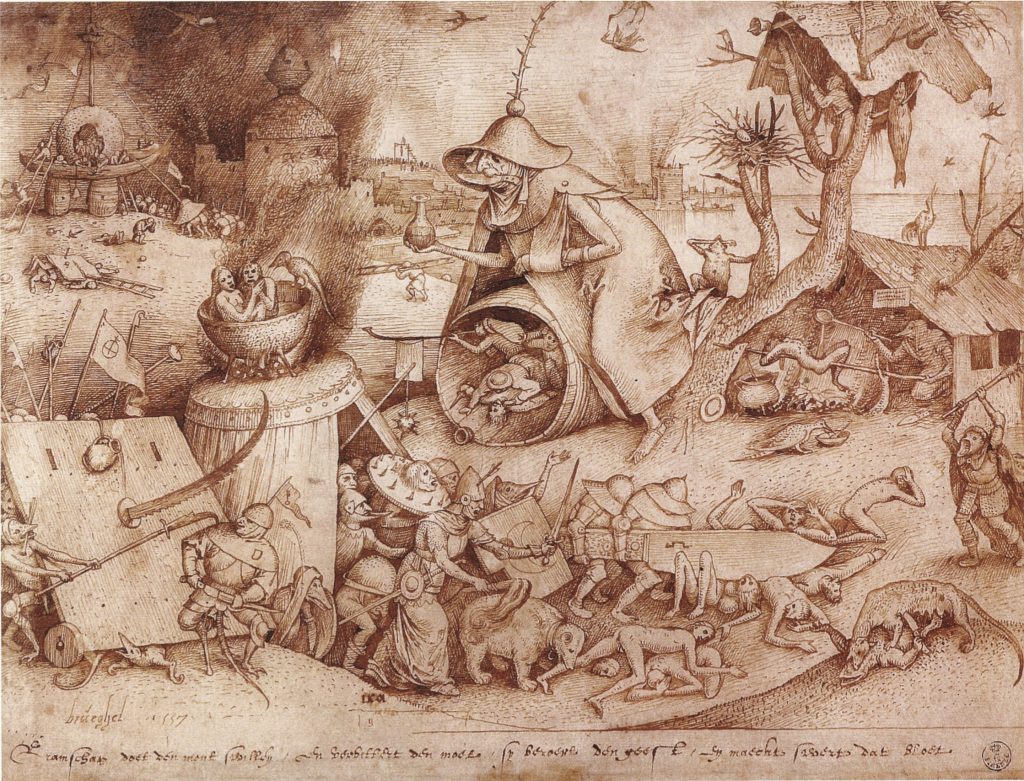
4. Wrath – Ira ↔ Humanity, Peacefulness
Wrath is directed both at oneself and others. It is often expressed in ways that provoke negative feelings in others as well. Wrath leads to impulsive actions that may be difficult to retract and can cause significant harm. Thus, a person consumed by wrath loses control over themselves.
Although wrath is one of the seven deadly sins, Aristotle already considered it one of the eleven basic emotions of every human being. It seems that no one is entirely exempt from experiencing the emotions associated with the deadly sins.
Opposites: Humanity, Peacefulness
Humanity and peacefulness are essential virtues that stand in opposition to the deadly sin of wrath (Ira). Wrath, often characterized by uncontrolled anger and aggression, leads to conflict and destruction on both personal and societal levels. In contrast, humanity and peacefulness represent compassion, understanding, and a willingness to resolve conflicts peacefully. Humanity involves respecting the dignity and rights of every individual and showing empathy. Peacefulness fosters a desire for harmony and the avoidance of violence. These virtues contribute to creating an environment of peace and mutual respect, where conflicts are resolved through dialogue and reconciliation.
Darkness cannot drive out darkness; only light can do that. Hate cannot drive out hate; only love can do that.
Martin Luther King Jr.
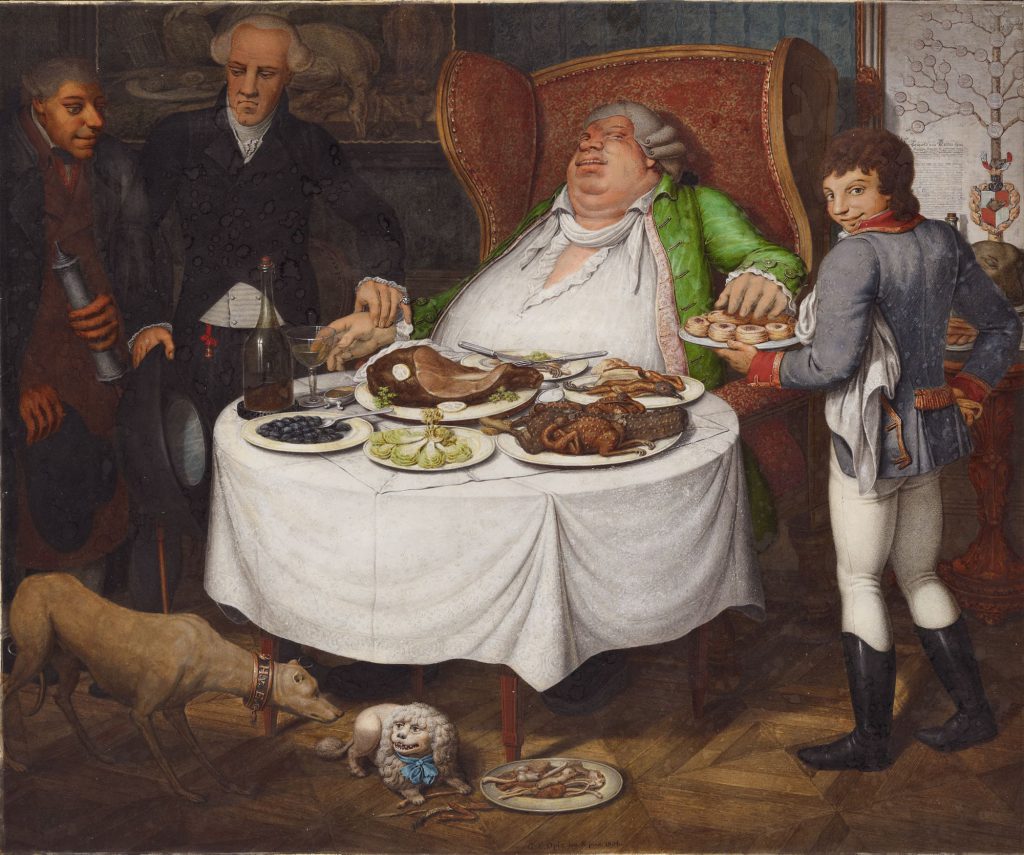
5. Gluttony – Gula ↔ Moderation, Abstinence
Excessive eating and drinking, as well as a generally extravagant lifestyle leading to wastefulness, is known as gluttony and is considered one of the seven deadly sins. In this regard, gluttony represents the opposite extreme of greed. A person who indulges in gluttony is viewed as ungrateful to God and may even become blind to Him.
Gluttony still affects many devout Christians today. This deadly sin also explains the modest life led by both nuns and monks. Indulging in gluttony threatens the individual with the torment of hell after death.
Opposites: Moderation, Abstinence
Modesty and abstinence stand in stark contrast to the deadly sin of gluttony (Gula). Gluttony, characterized by excessive consumption of food and drink, reflects a lack of moderation and selfishness that can harm both personal health and social well-being. In contrast, modesty means being content with what is necessary and maintaining one’s needs within a healthy measure. Abstinence teaches self-discipline and the ability to forego excessive pleasure in order to promote the well-being of oneself and others. These virtues support a sustainable lifestyle and the appreciation of the resources available to us.
Contentment means being satisfied with the little you have. Modesty and contentment with little are powerful tools that can make our lives happier.
Dalai Lama
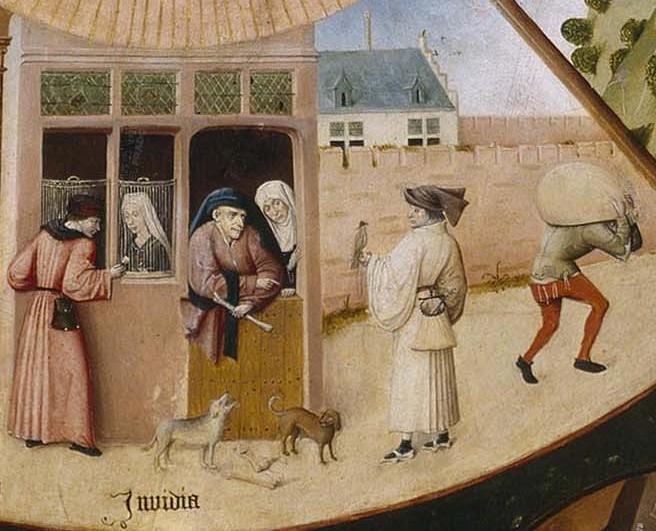
6. Envy – Invidia ↔ Favor, Gratitude
Envy arises from the constant comparison of oneself with others, where one always finds in others what one lacks oneself, leading to feelings of disadvantage. Envy towards the (perceived) advantages of others can even lead to resentment and hatred. The Church suggests gratitude as a remedy for this sin, as it can restore a sense of well-being for the envious person. Additionally, envy, in a positive sense, can indicate one’s own desires and needs.
Thus, a distinction can be made between constructive envy, which is not necessarily viewed as a negative emotion. In this case, the person may still want to have what they see in others, but this feeling is more associated with admiration rather than resentment. On the other hand, destructive envy, described in the list of deadly sins, is directly linked to resentment and can, at its worst, lead to immoral actions.
Opposites: Favor, Gratitude
Favor and gratitude are powerful counterpoints to the deadly sin of envy (Invidia). Envy, characterized by begrudging the happiness and success of others, leads to inner dissatisfaction and social tensions. In contrast, favor and gratitude represent a positive and appreciative attitude towards others and one’s own life. Favor means genuinely rejoicing in the successes and happiness of others, which strengthens social connections and fosters positive relationships. Gratitude helps one to appreciate their own life and achievements, resulting in a profound sense of contentment and inner peace. These virtues contribute to leading a harmonious and fulfilling life, free from negative emotions and conflicts.
Do not be envious of what others have. Recognize your own gifts and talents, and be grateful.
Maya Angelou
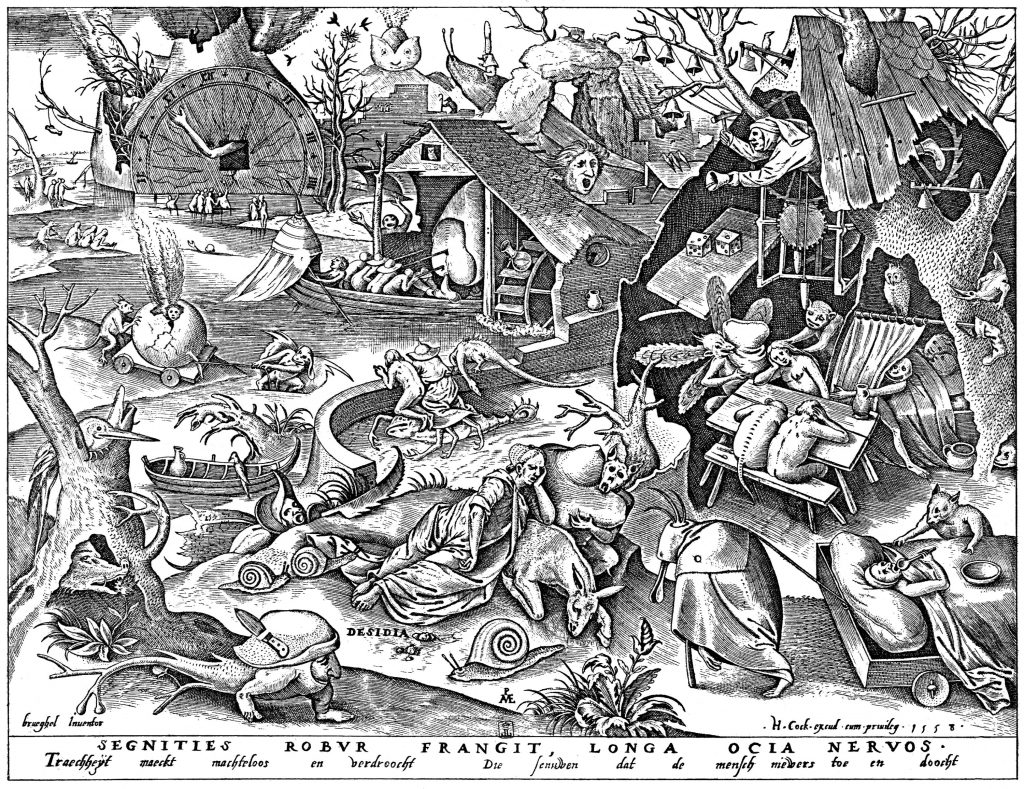
7. Sloth – Acedia ↔ Creativity, Courage
The last of the seven deadly sins extends beyond the common understanding of laziness or idleness. Sloth, or acedia, refers not only to physical and mental laziness but also to a „sloth of the heart“ that makes a person incapable of enduring themselves and their own life, leading to overall dissatisfaction. This condition causes insensitivity and a lack of empathy towards the needs of others. Furthermore, sloth results in a closed-off attitude towards God, as the slothful person is unwilling to fulfill what God demands.
Opposites: Creativity, Courage
Creativity and courage are powerful counterpoints to the deadly sin of sloth (acedia). Sloth, often characterized by laziness and a lack of motivation, leads to stagnation and hinders personal growth and progress. In contrast, creativity inspires new ideas and solutions by stimulating the mind and fostering innovation. Courage, the belief in one’s abilities and hope for a better future, drives us to actively pursue our goals and overcome challenges. These virtues help lead a fulfilling and productive life marked by progress and renewal.
All dreams can come true if we have the courage to pursue them.
Walt Disney
Reflections and Aphorisms on the Subject of Deadly Sins and Their Counterparts
Selected by Helma Dietz, Freising
The greatest threat to democracy is indifference.
Rafik Schami
The world thrives on people who do more than their duty.
Ewald Balser auf der Traueranzeige von der Familie für Alois Glück
We did not weave the web of life; we are merely a strand in it.
Jean Graighed George (1993)
Pessimism of the intellect – Optimism of the will.
Antoni Gramsci
Only those who are willing to achieve the impossible can save the future. This is more important today than ever.
Christine Hamel
The world has enough for everyone’s needs, but not enough for everyone’s greed.
Mahatma Gandhi
I can because I want to, what I must.
Immanuel Kant
Design of the project website with the WordPress theme „Twenty Twenty“: Christian Renner, www.deeply.design
© 2024, KULTUR-gut! Freising e.V.
